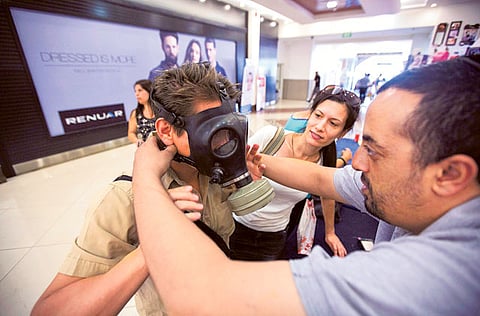US-led allies to hit Syria in days
The reaction of Bashar Al Assad's allies will have little impact on the ground

Dubai: The US and its allies will strike on Syria. The question is when and how other players would react to the strike? Dr Theodore Karasik, Director of Research and Consultancy at the Institute for Near East and Gulf Military Analysis (INEGMA), believes that the strike is imminent and should happen within the coming ten days.
“We are assuming that a punishing attack on Syria will occur shortly. These punitive strikes may be short in duration of a few days or long term, perhaps lasting up to several weeks depending on the successes and failures of the initial campaign,” Dr Karasik told Gulf News.
He said targeting is likely to be concentrated on Syria’s military infrastructure as well as chemical sites using incendiary precision-guided munitions and bombs.
“The concern, of course, regarding air strikes on Syria will be the counterstrikes by the Al Assad regime and its allies, Hezbollah and Iran. Al Assad’s military still possesses up to 50 per cent of its original SCUD missile inventory and we may see these missiles used to hit targets in neighbouring states — unless they are rendered useless as part of the coalition air attack on Syria,” he said.
He said that the rump state of Syria, as part of its counterstrike, will also likely attempt to destabilise Lebanon specifically along with other neighbours by using targeted car bombings in a continuation of what has occurred in the last two weeks..
Hezbollah along with its Iranian counterparts, Karasik said, will perhaps unleash rocket barrages against Israel as well as specific attacks against Western interests in the region and beyond.
“What will be important to watch for are two interesting and separate issues: The role of Russia, and the reaction of Al Qaeda affiliates in the Syrian battle space,” he said.
Karasik, who is the author of The Kingdom and the Kremlin strategic report said Russia, much as the Kremlin did during the Kosovo military campaign, will play the role of negotiator between the two sides. He said Al Qaeda affiliates, on the other hand, will use the punitive strikes to push forward their agenda by attacking anybody and any force in their way to achieve more strategic victories and to capture additional territory.
A final issue, he said, is the potential impact on the Free Syrian Army.
“Will the air strikes give them a tactical advantage? With the additional training and armaments from Saudi Arabia offered for the FSA to allow them an ability to make tactical gains, would the strikes work in their favour and to which extent,” he asked.
Karasik added that what is known at this stage that the Syrian chessboard, as well as the Levant, is likely to go through a dramatic change — and the coming days will hold the answer how and in what direction.



